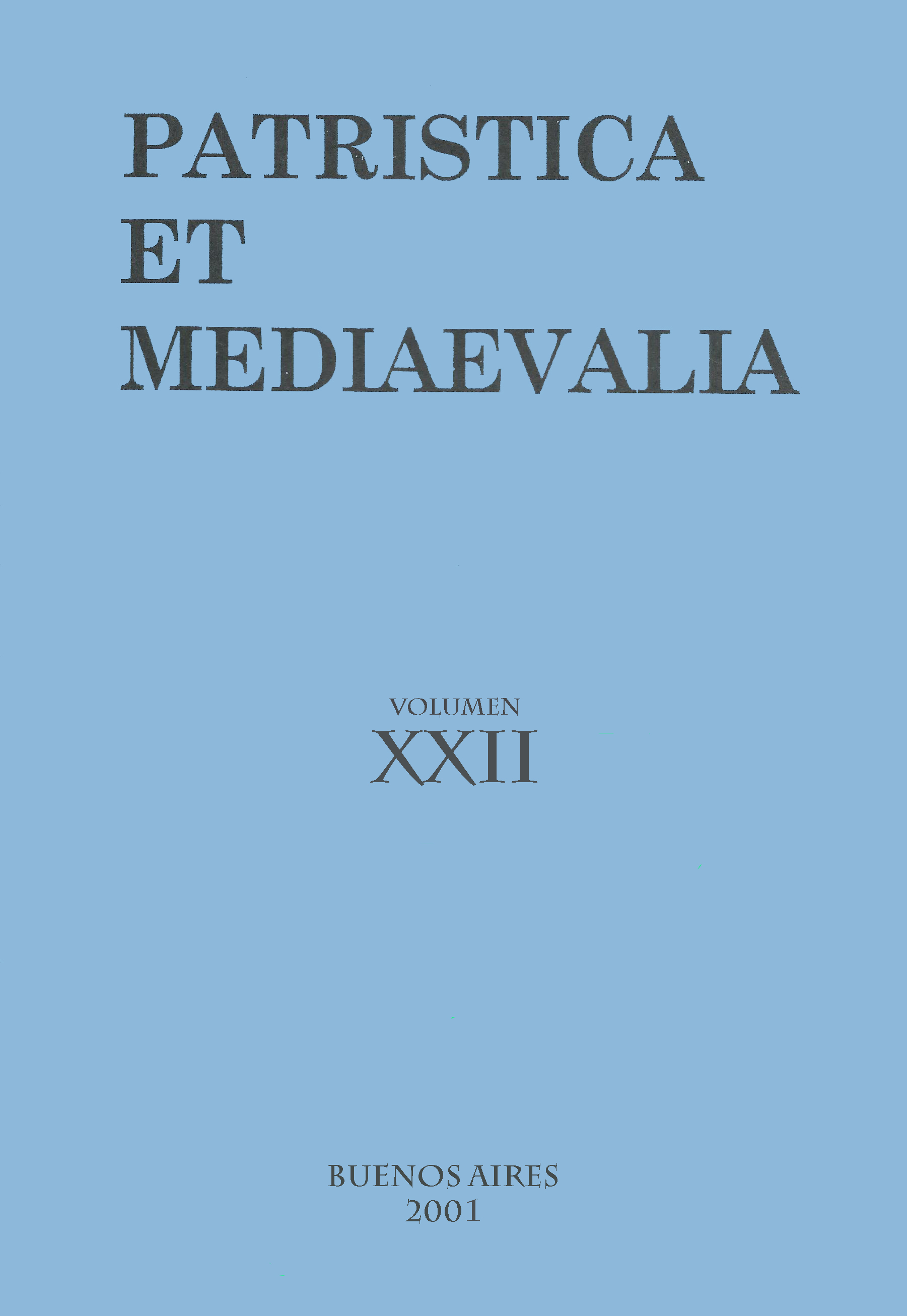Law and Natural Law in Duns Scotus (Hobbes reader of Scotus?)
Abstract
Canonical divisions of the history of philosophy usually present as drastic the break between Medieval and Modern thinking. One can genuinely ask whether that rupture has not started in the Middle Ages and to what extent many of the elements that characterise the Modernity are already present in that period. In that sense, the article seeks to establish some similarities between Medieval and Modern thinking, particularly the aspects concerning the relationships between the ethical-political thinking of Duns Scotus and some ideas of Hobbes, that, after a detailed study, reveal themselves as heirs of Medieval philosophical thinking.Downloads
References
Baeumker, C. (1913). Die christliche Philosophie des Mittelalters. En Hinneberg, P. (Hg.). Die Kultur der Gegenwart, 2º ed. Berlin, 338-431 (Reprint: Strasburger, E. (2018). Die Kultur der Gegenwart, vol. 2: Ihre Entwicklung und Ihre Ziele, Herausgegeben von Paul Hinneberg, Classic Reprint Series. London: Forgotten Books)
Batin, M. (1997). Les principes des choses en ontologie médiévale (Thomas d’Aquin, Scot, Occam). Bordeaux: Editions Bière.
Bonansea, B. (1991). L’uomo e Dio nel pensiero di Duns Scoto. Milano: Jaca Book.
De Boni, L. A. (1999). O homem no pensamento de Duns Scotus: aspectos característicos de sua antropologia. Veritas (Porto Alegre), 44(3), 707-726.
De Gandillac, M. (1968). Loi naturelle et fondements de l’ordre social selon les principes du bienheureux Duns Scot. In Commissio Scotistica Internacionales (ed.). De doctrina Ioannis Duns Scot, Acta Congressus Scotistici Internacionales, Oxonii et Edimburgi, del 11 al 17 sep 1966, Roma, Vol. 2. Roma: Cura Commissionis Scotisticae, 698-710.
De Lagarde, G. (1958). La naissance de l’esprit laïc au déclin du Moyen Âge, vol. II. Paris/Louvain: Beatrice/Nauwelaerts.
Flüeler, Ch. (1992). Rezeption und Interpretation der aristotelischen Politica im späten Mittelalter, vol. 2. Amsterdam-Philadelphia: B. R. Grüner.
Gilson, E. (1952). Jean Duns Scot: Introduction a Ses Positions Fondamentales. Paris: Vrin.
Goldstein, J. (1998). Nominalismus und Moderne- Zur Konstitution neuzeitlicher Subjektivität bei Hans Blumenberg und Wilhelm von Ockham. Freiburg: K. Albert.
Goncalves, J. C. (1990). Joao Duns Escoto e a ciência ética. Temas de Filosofía Medieval (Leopoldianum XVII), 48, 121-137.
Harris, C. R. S. (1959). Duns Scot, vol. 2. New York: Clarendon Press.
Honnefelder, L. (1987). Der zweite Anfang der Metaphysik, Voraussetzungen, Ansätze und Folgen der Wiederbegründung der Metaphysik im 13. und 14. Jahrhundert. In Beckmann, J. P. et al. (Hrsg.). Philosophie im Mittelalter, Entwicklungslinien und Paradigmen. Hamburg: Meiner, 165-186.
Honnefelder, L. (1990). Scientia transcendens, Die formale Bestimmung von Seiendheit und Realität in der Metaphysik des Mittelalters und der Neuzeit. Hamburg: Meiner.
Iammarrone, L. (1999). Giovanni Duns Scoto - Metafisico e Teologo. Roma: Miscellanea Francescana.
Marchesi, A. (1968). L’autorità politica e la legge naturale nel pensiero di Giovanni Duns Scoto e di S. Tommaso d’Aquino. In Commissio Scotistica Internacionales (ed.). De doctrina Ioannis Duns Scot, Acta Congressus Scotistici Internacionales, Oxonii et Edimburgi, del 11 al 17 sep 1966, Roma, Vol. 2. Roma: Cura Commissionis Scotisticae, 671-682.
Möhle, H. (1995). Ethik als scientia practica nach Johannes Duns Scotus. Eine philosophische Grundlegung (Beiträge zur Geschichte der Philosophie und Theologie des Mittelalters). Münster: Aschendorff.
Möhle, H. (1996). Wille und Moral, Zur Voraussetzung der Ethik des Johannes Duns Scotus und ihrer Bedeutung für die Ethik Immanuel Kants. In Honnefelder, L. et al. (eds.). John Duns Scotus, Metaphysics & Ethics (Studien Und Texte Zur Geistesgeschichte Des Mittelalters). Leiden/New York/Berlin: Brill, 573-594.
Picavet, F. (1905). Esquisse d’une histoire générale et comparée des philosophies médiévales. Paris: F. Alcan.
Schneider, J. H. J. (1986). Thomas Hobbes und die Spätscholastik. PhD Dissertation, Bonn.
Schwendinger, F. (1934). Metaphysik des Sittlichen nach Johannes Duns Scotus. Wissenschaft und Weisheit, 1, 180-210.
Schwendinger, F. (1935). Metaphysik des Sittlichen nach Johannes Duns Scotus. Wissenschaft und Weisheit, 2, 18-50 und 112-135.
Schwendinger, F. (1936). Metaphysik des Sittlichen nach Johannes Duns Scotus. Wissenschaft und Weisheit, 3, 93-119 und 161-190.
Sileo, L. (1999). Natura e norma, Dalla ‘Summa Halensis’ a Bonaventura. En Società Italiana di Studi Francescani (ed.). Etica e Politica: Le teorie dei frati mendicanti nel Due e Trecento: atti del XXVI Convegno internazionale, Assisi, 15-17 ottobre 1998. Spoleto: Centro italiano di studi sull’alto medioevo, 29-57.
Stratenwerth, G. (1951). Die Naturrechtslehre des Johannes Duns Scotus. Göttingen: Vandenhoeck und Ruprecht.
Tabarroni, A. (1999). Francescanesimo e riflessione politica sino ad Ockham. En Società Italiana di Studi Francescani (ed.). Etica e Politica: Le teorie dei frati mendicanti nel Due e Trecento: atti del XXVI Convegno internazionale, Assisi, 15-17 ottobre 1998. Spoleto: Centro italiano di studi sull’alto medioevo, 203-230.
Wolter, A. (1986). Duns Scotus On the Will and Morality. Washington: Catholic University of American Press.
1. The authors who publish in this magazine accept the following conditions:
-
They retain the copyright and grant to the magazine the right of the first publication, with the work registered under the Attribution-ShareAlike 4.0 International License that allows third parties to use what is published as long as they mention the authorship of the work and the first publication in this magazine.
-
They can make other independent and additional contractual agreements for the non-exclusive distribution of the version of the article published in this magazine (eg. include it in an institutional repository or publish it in a book) provided that they clearly indicate that the work was first published in this journal.
-
They are allowed and recommended to publish their work on the Internet (for example on institutional or personal pages).
2. AutoArchive Conditions. Authors are allowed and encouraged to distribute post-print electronic versions of their manuscripts because it promotes their circulation, a possible increase of quotation and a major reach among the Academic community. Color RoMEO: blue.













